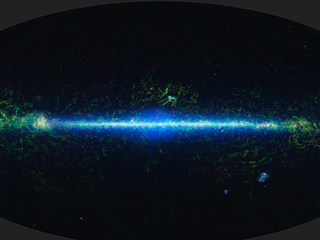Solar System Universe Galaxy Order
Our planetary arrangement is located in an outer spiral arm of the Galaxy galaxy.
Our solar system consists of our star, the Sun, and everything bound to information technology past gravity – the planets Mercury, Venus, World, Mars, Jupiter, Saturn, Uranus, and Neptune; dwarf planets such equally Pluto; dozens of moons; and millions of asteroids, comets, and meteoroids. Across our own solar system, nosotros have discovered thousands of planetary systems orbiting other stars in the Milky Mode.
Go farther. Explore Our Solar System in Depth ›
10 Things to Know Almost Our Solar System
10 Need-to-Know Things Almost the Solar System
1
1 of Billions
Our solar system is fabricated up of a star, eight planets, and countless smaller bodies such as dwarf planets, asteroids, and comets.
ii
Meet Me in the Orion Arm
Our solar system orbits the center of the Galaxy milky way at about 515,000 mph (828,000 kph). We're in one of the galaxy's four screw arms.
3
A Long Way Circular
It takes our solar system about 230 one thousand thousand years to complete one orbit around the galactic center.
4
Spiraling Through Space
There are three full general kinds of galaxies: elliptical, spiral, and irregular. The Milky way is a spiral galaxy.
five
Good Atmosphere(southward)
Our solar system is a region of space. It has no atmosphere. Just it contains many worlds – including Earth – with many kinds of atmospheres.
6
Many Moons
The planets of our solar organisation – and even some asteroids – concur more than 200 moons in their orbits.
7
Ring Worlds
The four giant planets – and at least ane asteroid – have rings. None are every bit spectacular equally Saturn's gorgeous rings.
viii
Leaving the Cradle
More than 300 robotic spacecraft have explored destinations beyond Earth's orbit, including 24 American astronauts who fabricated the trip from the Earth to the Moon.
9
Life equally We Know Information technology
Our solar system is the only i known to back up life. So far, we only know of life on Earth, but we're looking for more everywhere nosotros can.
10
Far-Ranging Robots
NASA'due south Voyager ane and Voyager 2 are the only spacecraft to go out our solar organization. Three other spacecraft – Pioneer 10, Pioneer 11, and New Horizons – will eventually hitting interstellar space.
FAQ: Which Spacecraft are Headed to Interstellar Space?
FAQ: Which Spacecraft are Headed to Interstellar Space?
Five spacecraft take achieved enough velocity to eventually travel beyond the boundaries of our solar organisation. Ii of them reached the unexplored space betwixt the stars after several decades in space.
- Voyager 1 went interstellar in 2012 and Voyager 2 joined it in 2018. Both spacecraft are withal in communication with World. Both spacecraft launched in 1977.
- NASA's New Horizons spacecraft is currently exploring an icy region beyond Neptune chosen the Kuiper Chugalug. It somewhen volition leave our solar system.
- Pioneer ten and Pioneer 11 also volition ultimately travel silently among the stars. The spacecraft used up their power supplies decades ago.
Solar System Universe Galaxy Order,
Source: https://solarsystem.nasa.gov/solar-system/our-solar-system/overview/
Posted by: stantonfackeffaced.blogspot.com



0 Response to "Solar System Universe Galaxy Order"
Post a Comment